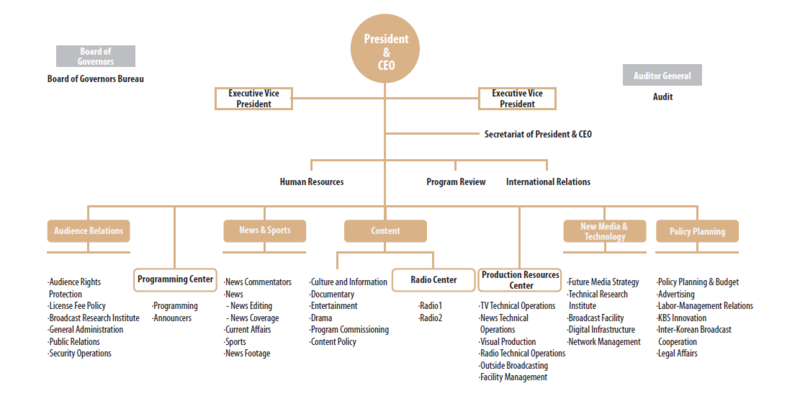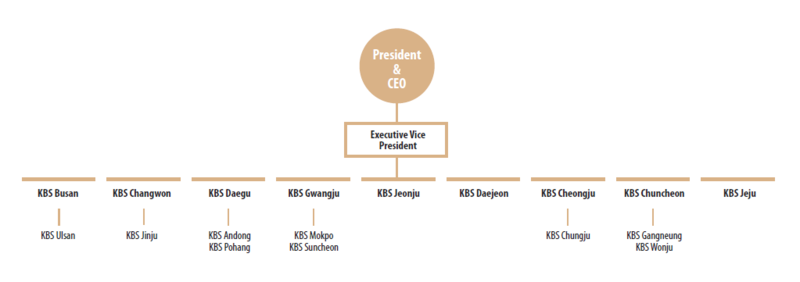Beef Company KBS
Contents
About KBS
With a total of 6 radio channels, 8 TV channels, 4 DMB channels, 2 international broadcasting channels and almost 5000 employees, Korean Broadcasting System (KBS) is currently the largest and most influential broadcasting company in South Korea. Over the years, KBS has produced various shows that are hugely popular with the general public both on a local and global scale. As of 2014, KBS World can be viewed in 52 countries, spreading Korean culture to the world
Mission
As one of the most influential public services broadcaster in Korea, KBS believes that it is their "core duty to reflect the diverse voices of Korea through the distinctiveness of its programs".
History of KBS
KBS is founded on February 16, 1927 by the Governor General of Korea as Kyeongseong Broadcasting Corporation (JODK). They are the first organization to initiate radio broadcasting service at that time, and subsequently commenced television broadcasting service in 1961.
Organizational Structure of KBS
KBS is a public sector company that is owned by the governments. The President of Korea is in charge of appointing the President & CEO of the corporation based on the recommendation of the Board of Governors. The members of the executive body is appointed for three years, and has a chance of being elected again once their term ends.
President of KBS
Gil Hwan-young, the 20th President and CEO of KBS began his three-year term on November 23, 2012. He started his career in KBS in 1981 as a TV producer. Over the years, he held several positions, such as foreign correspondent in Paris, Executive Director of Programming & Planning, Managing Director of Content Division and Executive Vice President.
October last year, Mr. Gil is elected as the president of the Asia Pacific Broadcasting Union (ABU).
Main and Local Stations
Rather than having one local station like MBC or having a network of multiple broadcast stations in different regions like SBS; KBS own both their main station and local stations. Based on their organizational report in 2013, KBS now own one main station, 9 headquarters, and 9 local stations.
With local stations, KBS can ensure that the content generated will not only be able to grasp the attention of citizens living in that district, but also deepen the understanding each region have for each other through a cultural exchange. In addition to that, the different local stations will also work together to produce a show that reflects the unique colors of the different regions, further educating the viewers of the differences that exist in the country.
Our Recommendations
Mobile drama
Mobile dramas are now the in-thing in Japan; the short time frame for each episode being suitable for people who are on the move. KBS is known for producing dramas that hook viewers in. To diversify the types of dramas that they are producing, mobile drama will be an interesting add-on. Two episodes can be aired per week, and viewers can have the choice of paying to view advance episodes in the event that they are unwilling to wait for another week.
Creation of a KTV channel
Noraebang, more commonly known as KTV is a common sight in Korea. However, it can be a hassle to travel whenever you feel like singing. Therefore, it will be a good idea to have a channel where users can choose the songs that they are interested in and have fun singing at home with either their friends, or families.
Interactive television
Something that the web has advantage over television will be the interactivity it provides. Thus, to stay competitive it is important to combine interactivity with current elements in broadcast stations.
KBS can allow viewers to feel more attached to their dramas by allowing them to decide certain aspects of the plot. This will intrigue viewers and let them have a sense "ownership" over the dramas.
International TV shows(with Korean subtitles)
As of now, cable channels are the only source of movies. To gain a higher market share, KBS can consider branching into airing movies.
KBS Famous Programs/Dramas

Downloads
Download our Company Presentation Slides on KBS here!



